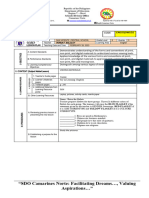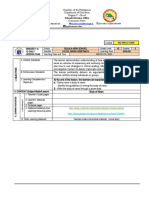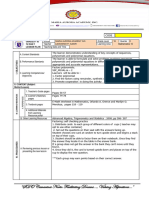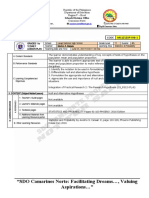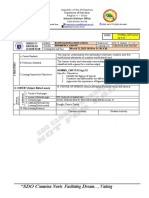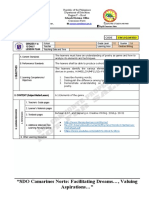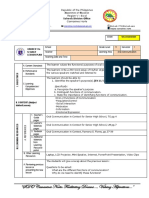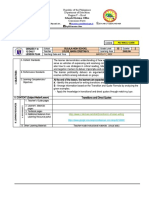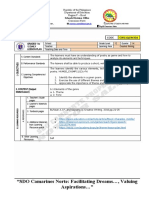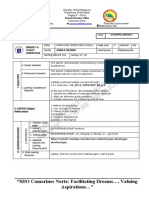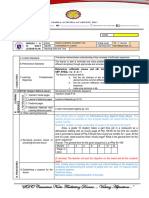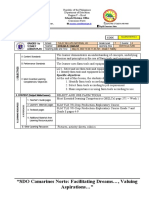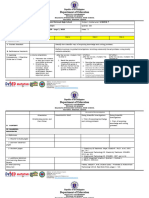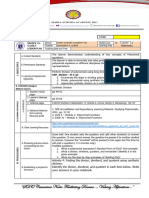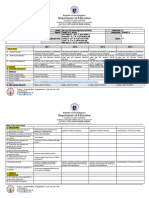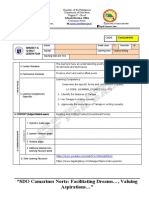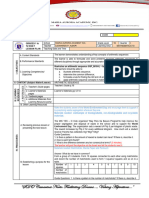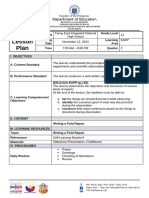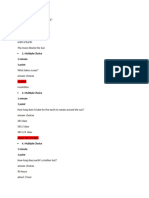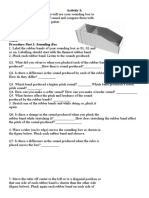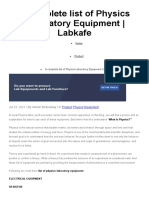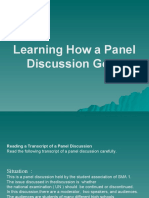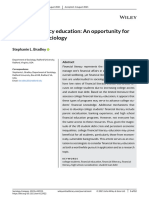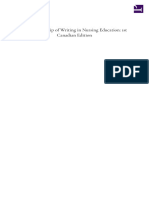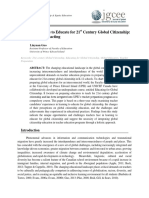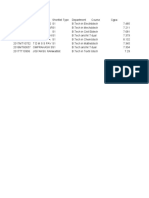DLP OBSERVATION AND INFERENCE
DLP OBSERVATION AND INFERENCE
Uploaded by
Jeanisil CerenoCopyright:
Available Formats
DLP OBSERVATION AND INFERENCE
DLP OBSERVATION AND INFERENCE
Uploaded by
Jeanisil CerenoOriginal Title
Copyright
Available Formats
Share this document
Did you find this document useful?
Is this content inappropriate?
Copyright:
Available Formats
DLP OBSERVATION AND INFERENCE
DLP OBSERVATION AND INFERENCE
Uploaded by
Jeanisil CerenoCopyright:
Available Formats
Republic of the Philippines
Department of Education
Region V – Bicol
Schools Division Office
Camarines Norte
Eco Athletic Field, F. Pimentel Ave., camarines.norte@deped.gov.ph (054) 440-1772/(054) 440-4464
Daet, Camarines Norte DepEdCamarines Norte
CODE SCI7Q2W3D1
GRADES 1 to School VIMZONS PILOT HIGH SCHOOL Grade Level 7 Quarter 2
12 DAILY Teacher JEANISIL M. CERENO Learning Area SCIENCE
LESSON PLAN Teaching Date and Time
A. Content
Standards
B. Performance
Standards
I. OBJECTIVES
The learners should be able to describe the components of a scientific
C. Learning investigation
Competenci S7MT Ia-1
es/ OBJECTIVES:
Objectives 1.Make more detailed observation on particular objects or events ,
2.Differentiate an observation from an inference
3. Appreciate the importance of gaining skills in observing and inferring.
II. CONTENT (Subject
Matter/Lesson) SCIENTIFIC INVESTIGATION (OBSERVATION AND INFERENCE)
1. Teacher’s
Guide
pages
2. Learner’s
Materials
III. LEARNING RESOURCES
A. REFERENCES
pages
3. Textbook
pages
4. Additional
Materials
from
Learning
Resource
portal
B. Other Learning
Resources
“SDO Camarines Norte: Facilitating
Dreams…, Valuing Aspirations…”
Republic of the Philippines
Department of Education
Region V – Bicol
Schools Division Office
Camarines Norte
Eco Athletic Field, F. Pimentel Ave., camarines.norte@deped.gov.ph (054) 440-1772/(054) 440-4464
Daet, Camarines Norte DepEdCamarines Norte
The teacher will remind students on COVID -19 protocols. INDICATOR NO. 4
Let the students observe the given picture….
Oprion 1
Present science tricks/magic. (e.g. floating liquids, elephant toothpaste
or any tricks/familiar to the teacher and with available materials)
Can you explain why it happened
Do you want to find out why and how it happened?
A. ELICIT
(2 min)
Option 2
The teacher will show an object to the class (e.g. . chalk).Let the students
observe the object and allow them to give their observations .
Then ask the students
1. What senses did you use to be able to make such statements?
2. Are your answer based on what is actually observed ?
3. Which are based on past experiences?
The students will study their answers
IV. PROCEDURES
The students can answer in English or Filipino or any dialect you are
comfortable with.(INDICATOR #3)
B. ENGAGE Let the students observe and analyze the picture.
(6 min)
Base on your answer in each pictures
What can you say about the picture?
What is in the picture ?/what observation can you make from the
picture?
Based from what you have observed can you give the reasons why is
that happen?
Based from the picture,identify the following statements whether it is an
observation or an inference
“SDO Camarines Norte: Facilitating
Dreams…, Valuing Aspirations…”
Republic of the Philippines
Department of Education
Region V – Bicol
Schools Division Office
Camarines Norte
Eco Athletic Field, F. Pimentel Ave., camarines.norte@deped.gov.ph (054) 440-1772/(054) 440-4464
Daet, Camarines Norte DepEdCamarines Norte
1. There are people swimming on the sea.
2. The guy is wearing sunglasses because he wants to protect his eyes on
the radiation coming from the sun.
3. It is a summertine.
4. The man is floating on the sea.
5. The girl is having her swimming lesson from her trainor.
Let us find out if your answers are correct as we go with our activity
By Observing the picture the students canSAY THAT the picture shows girl
having her swimming lessons shows an integration across the MAPEH
Note:
This part shows application of knowledge within the curriculum teaching area. In
Science, observation is being discuss in science 7 and in research especially when they
are doing an experiment ?Within the curriculum physics (INDICATOR #1).
These questions will be answered in todays lessons.
( At this point objectives of the lesson will be posted)
1. Pre-lab:
PROJECT WATCH INTEGRATION: Before the acivity conducted, The teacher
give the rules/ policies on how the studens will do the activity. Every groups
have their task to do and the teacher give the responsibilitie of each
assigned task. (Reporter, timer, secretary and leader)
Giving of instructions and presentation of rubrics to be used in rating
student’s activity and other clarifications.
Each group will have 10 minutes to do the activity.Project watch
integration
C.EXPLORE
(15 min)
RUBRICS FOR GROUP ACTIVITY
“SDO Camarines Norte: Facilitating
Dreams…, Valuing Aspirations…”
Republic of the Philippines
Department of Education
Region V – Bicol
Schools Division Office
Camarines Norte
Eco Athletic Field, F. Pimentel Ave., camarines.norte@deped.gov.ph (054) 440-1772/(054) 440-4464
Daet, Camarines Norte DepEdCamarines Norte
2. Laboratory Proper:
The class will be divided into 2 groups. Each group will be given a
task to perform. INDICATOR NO. 4&6
The class will be divided into 2 groups. Each group will be given a task to
perform.
SET A
(This activity is for students inclined visual literacy
Study picture A. Indicate which of the statements below are qualitative observation
and quantitative observation by marking the appropriate column with a check mark.
“SDO Camarines Norte: Facilitating
Dreams…, Valuing Aspirations…”
Republic of the Philippines
Department of Education
Region V – Bicol
Schools Division Office
Camarines Norte
Eco Athletic Field, F. Pimentel Ave., camarines.norte@deped.gov.ph (054) 440-1772/(054) 440-4464
Daet, Camarines Norte DepEdCamarines Norte
Statements for Picture A observation inference
1.The buildings were destroyed.
2.Typhoon was come to this place..
3.Earthquake was done.
4.There any houses affected.
5.Many people have lost their
homes.
Questions:
1. Which statements are descriptive in nature? Do you think these are
observations? Why?
2. Which statements are based from the past experiences ? Do you think these
are inference? Why?
3. What are the advantages of identifying observations . Check the
corresponding sentences.
______________ allow you to explore concepts and experiences in more
detail.
______________ enables the observer to observe, interact with and gain a
detailed picture of objects and events in their environment.
______________It is statistically represented.
4. What are the advantages of identiying the inference on the given situations?
Check the corresponding sentences
______________Provides more accurate results.
______________ Can help people what will they do next.
______________ The process is time consuming
5. Differentiate observations from inference. Complete the following sentences.
_______________ is recognizing or noting a fact or occurrence.It is is something that
can be easily seen and use five senses.
“SDO Camarines Norte: Facilitating
Dreams…, Valuing Aspirations…”
Republic of the Philippines
Department of Education
Region V – Bicol
Schools Division Office
Camarines Norte
Eco Athletic Field, F. Pimentel Ave., camarines.norte@deped.gov.ph (054) 440-1772/(054) 440-4464
Daet, Camarines Norte DepEdCamarines Norte
_______________is a conclusion based on observations and/or prior knowledge.It
is is a guess or idea that needs to be supported by evidence.
SET B
Observation -inference
(This activity is for students inclined Critical Thinking Skills)
A group of students was given a task to clean the garden.As they
clean they observe the following.
A. The soil is fertile.
B. There are plants die.
C. Aphids are on the leaf.
D. Some plants are healthy.
E. They put fertilizer.
Questions:
6. Which statements are descriptive in nature? Do you think these are
observations? Why?
7. Which statements are based from the past experiences ? Do you think these
are inference? Why?
8. What are the advantages of identifying observations . Check the
corresponding sentences.
______________ allow you to explore concepts and experiences in more
detail.
______________ enables the observer to observe, interact with and gain a
detailed picture of objects and events in their environment.
______________It is statistically represented.
9. What are the advantages of identiying the inference on the given situations?
Check the corresponding sentences
______________Provides more accurate results.
______________ Can help people what will they do next.
______________ The process is time consuming
10. Differentiate observations from inference. Complete the following sentences.
_______________ is recognizing or noting a fact or occurrence.It is is something that
can be easily seen and use five senses.
“SDO Camarines Norte: Facilitating
Dreams…, Valuing Aspirations…”
Republic of the Philippines
Department of Education
Region V – Bicol
Schools Division Office
Camarines Norte
Eco Athletic Field, F. Pimentel Ave., camarines.norte@deped.gov.ph (054) 440-1772/(054) 440-4464
Daet, Camarines Norte DepEdCamarines Norte
.
_______________is a conclusion based on observations and/or prior knowledge.It
is is a guess or idea that needs to be supported by evidence.
Note:Due to the situation (COVID -19) The activity will be done individually
but they have different task.Afterwards they will select the best work on
their group and that will be presented to the class.INDICATOR NO. 5
1. Presentation of group’s output.
D.EXPLAIN 2. Discussion:
(15 min) The teacher will facilitate the discussion of the guide questions.
The teacher will discuss further the group output presented.
Misconceptions should be corrected by the teacher.
Revisit the answers of the students under *engage part” and check if their
answers are correct.
he teacher will discuss further the group output presented.
E. ELABORATE Revisit the answers of the students under *engage part” and check if their
(8 min) answers are correct.
Videoclips about the diffrence between observation and inference
https://www.youtube.com/watch?v=mJRo_C0v6UU&t=56s
1. Which of the following observation about the object in
the image is correct?
A. The plant has fertilizer.
B. The plant produces a lot of nectar
C. The flower has 7petals.
D. Plant has butterfly
F. EVALUATE
(8 min)
2,. Differentiate an observation from an inference in the following
statements. Underline the sentence that shows observation and encircle the
word that shows inference
A. The clouds are dark; it will rain.
B. Jose is absent; he must be sick
“SDO Camarines Norte: Facilitating
Dreams…, Valuing Aspirations…”
Republic of the Philippines
Department of Education
Region V – Bicol
Schools Division Office
Camarines Norte
Eco Athletic Field, F. Pimentel Ave., camarines.norte@deped.gov.ph (054) 440-1772/(054) 440-4464
Daet, Camarines Norte DepEdCamarines Norte
C. There are ants on the bread, it must be sweet.
D. The power has been cut off ; that is why the room is dark.
2. Which of the following statements shows the importance of gaining skills
in observing and inferring?
A. You can make intelligent and accurate observations and inference about
objects and events, which allow you to solve your problem easily.
B. You can provide information to an object or event that is unrelated to it.
C. It. May be difficult for you to solve your problem.
D. B and c
Observe any of the following at home: a tree or plant in your garden , a
(9 EXTEND member of the family. Give as many statements about the object or person
(2 min) you have chosen
V. REMARKS
A. No. of learners
who earned 80%
in the evaluation
B. No. of learners
who require
additional
activities for
remediation
C.Did the lesson
work? No. of
learners who
have caught up
w/ the lesson
D.No. of learners
VI. REFLECTION
who continue to
require
remediation
E. Which of my
teaching
strategies worked
well? Why did
these work?
F. What difficulties
did I encounter
which my
principal or
supervisor can
help me solve?
G.What innovation
or localized
materials did I
use/discover
which I wish to
share with other
“SDO Camarines Norte: Facilitating
Dreams…, Valuing Aspirations…”
Republic of the Philippines
Department of Education
Region V – Bicol
Schools Division Office
Camarines Norte
Eco Athletic Field, F. Pimentel Ave., camarines.norte@deped.gov.ph (054) 440-1772/(054) 440-4464
Daet, Camarines Norte DepEdCamarines Norte
teachers?
PROCEDURES NOTES / SUGGESTIONS / RECOMMENDATIONS
A. Reviewing previous lesson
or presenting the new
lesson
B. Establishing a purpose for
the lesson
C. Presenting
examples/instances of the
new lesson
D. Discussing new concepts
and practicing new skills #1
E. Discussing new concepts
and practicing skills #2
F. Developing mastery
G. Making generalizations and
abstractions about the
lesson
H. Finding practical
applications of concepts
and skills in daily living
I. Evaluating learning
J. Additional activities for
application or remediation
Prepared by :
JEANISIL M. CERENO
Checked and Observed:
_____________________________ _______________________
“SDO Camarines Norte: Facilitating
Dreams…, Valuing Aspirations…”
Republic of the Philippines
Department of Education
Region V – Bicol
Schools Division Office
Camarines Norte
Eco Athletic Field, F. Pimentel Ave., camarines.norte@deped.gov.ph (054) 440-1772/(054) 440-4464
Daet, Camarines Norte DepEdCamarines Norte
“SDO Camarines Norte: Facilitating
Dreams…, Valuing Aspirations…”
You might also like
- Nova SBE Handbook Students General InformationDocument32 pagesNova SBE Handbook Students General InformationVasco TamenNo ratings yet
- lESSON PLAN 3is 6Document7 pageslESSON PLAN 3is 6Aiza AbantoNo ratings yet
- 2024-dlp q1 Particles of Model TrueDocument11 pages2024-dlp q1 Particles of Model TrueJeanisil CerenoNo ratings yet
- SDO Camarines Norte: Facilitating Dreams, Valuing AspirationsDocument6 pagesSDO Camarines Norte: Facilitating Dreams, Valuing AspirationsChristine May CribeNo ratings yet
- Health 9 Cot 2 DLPDocument8 pagesHealth 9 Cot 2 DLPRoby Peña GadilNo ratings yet
- ENGLISH 5-Viewing MaterialsDocument4 pagesENGLISH 5-Viewing Materialsverna baloloy100% (1)
- Local Media3990896996027363374Document8 pagesLocal Media3990896996027363374monica macaleNo ratings yet
- COT G10 Mar 16Document8 pagesCOT G10 Mar 16Cristina LolosNo ratings yet
- Math 42Document6 pagesMath 42Christine May CribeNo ratings yet
- MATH10Q1W7D32Document5 pagesMATH10Q1W7D32leonardoalbor05No ratings yet
- Grade 10-Quarter 3 - DLPDocument8 pagesGrade 10-Quarter 3 - DLPLeah MatiasNo ratings yet
- Lesson Plan 5 3isDocument6 pagesLesson Plan 5 3isAiza AbantoNo ratings yet
- SDO Camarines Norte: Facilitating Dreams, Valuing AspirationsDocument6 pagesSDO Camarines Norte: Facilitating Dreams, Valuing AspirationsSalve SerranoNo ratings yet
- Orgt MGTDocument5 pagesOrgt MGTRoserain AecabNo ratings yet
- Schools Division Office: Perform Hand and Foot Spa (HS)Document6 pagesSchools Division Office: Perform Hand and Foot Spa (HS)Divina ArevaloNo ratings yet
- SDO Camarines Norte: Facilitating Dreams, Valuing AspirationsDocument6 pagesSDO Camarines Norte: Facilitating Dreams, Valuing AspirationsSalve SerranoNo ratings yet
- 2024-dlp q1 Particles of ModelDocument11 pages2024-dlp q1 Particles of ModelJeanisil CerenoNo ratings yet
- Cot Angie CircleDocument10 pagesCot Angie CirclegerabunaoNo ratings yet
- SDO Camarines Norte: Facilitating Dreams, Valuing AspirationsDocument8 pagesSDO Camarines Norte: Facilitating Dreams, Valuing AspirationsAnn Maureen ConcepcionNo ratings yet
- LP BlankDocument3 pagesLP BlankVillaluz Delos Reyes ZharinaNo ratings yet
- Abmae12 Iw5d1Document6 pagesAbmae12 Iw5d1Arlene Caceres GacheNo ratings yet
- SDO Camarines Norte: Facilitating Dreams, Valuing AspirationsDocument7 pagesSDO Camarines Norte: Facilitating Dreams, Valuing AspirationsSalve SerranoNo ratings yet
- SDO Camarines Norte: Facilitating Dreams, Valuing AspirationsDocument7 pagesSDO Camarines Norte: Facilitating Dreams, Valuing AspirationsMaribeth AbantoNo ratings yet
- History-Of-The-Periodic Table-Dlp-Reading Mat - JOVEN PAITANDocument5 pagesHistory-Of-The-Periodic Table-Dlp-Reading Mat - JOVEN PAITANKIM ANN OPENA VILLAROSANo ratings yet
- CW11Q1W3D3Document7 pagesCW11Q1W3D3Josua GarciaNo ratings yet
- COT G10 Mar 21Document7 pagesCOT G10 Mar 21Cristina LolosNo ratings yet
- Schools Division Office: ENG4Q1W2D1Document7 pagesSchools Division Office: ENG4Q1W2D1Zel MayNo ratings yet
- SDO Camarines Norte: Facilitating Dreams, Valuing AspirationsDocument4 pagesSDO Camarines Norte: Facilitating Dreams, Valuing Aspirationsshuckss taloNo ratings yet
- OC11Q1W3D1 Draft 1 TrueDocument6 pagesOC11Q1W3D1 Draft 1 TrueChristine ApinNo ratings yet
- COT G10 Mar 17Document9 pagesCOT G10 Mar 17Cristina LolosNo ratings yet
- SDO Camarines Norte: Facilitating Dreams, Valuing AspirationsDocument4 pagesSDO Camarines Norte: Facilitating Dreams, Valuing Aspirationsshuckss taloNo ratings yet
- Boyles LawDocument7 pagesBoyles Lawapi-668571149No ratings yet
- Grade 10-Observing Correct Grammar in Making DefinitionsDocument8 pagesGrade 10-Observing Correct Grammar in Making DefinitionsLeah MatiasNo ratings yet
- SDO Camarines Norte: Facilitating Dreams, Valuing AspirationsDocument8 pagesSDO Camarines Norte: Facilitating Dreams, Valuing AspirationsMUGER SALUANNo ratings yet
- EAPPW3D4Document7 pagesEAPPW3D4Jolina SalenNo ratings yet
- Grade 10-GIVING EXPANDED DEFINITIONS OF WORDSDocument7 pagesGrade 10-GIVING EXPANDED DEFINITIONS OF WORDSLeah MatiasNo ratings yet
- SDO Camarines Norte: Facilitating Dreams, Valuing AspirationsDocument6 pagesSDO Camarines Norte: Facilitating Dreams, Valuing Aspirationsshuckss taloNo ratings yet
- MATH10Q1W1D2Document5 pagesMATH10Q1W1D2leonardoalbor05No ratings yet
- Cot - DLPDocument6 pagesCot - DLPJosua GarciaNo ratings yet
- Final - CO2 - Lesson Plan in Reading SY 2021 2022Document5 pagesFinal - CO2 - Lesson Plan in Reading SY 2021 2022Angel PilareNo ratings yet
- Entrep Lesson PlanDocument8 pagesEntrep Lesson PlanRoserain AecabNo ratings yet
- pr1 DLLDocument44 pagespr1 DLLGracee UyNo ratings yet
- MATH10Q1W2D1Document4 pagesMATH10Q1W2D1leonardoalbor05No ratings yet
- SDO Camarines Norte: Facilitating Dreams, Valuing AspirationsDocument9 pagesSDO Camarines Norte: Facilitating Dreams, Valuing AspirationsNoelma CabajarNo ratings yet
- Schools Division Office: Perform Hand and Foot Spa (HS)Document7 pagesSchools Division Office: Perform Hand and Foot Spa (HS)Divina ArevaloNo ratings yet
- DLL Science 7, Q1W1Document8 pagesDLL Science 7, Q1W1angel pranadaNo ratings yet
- MATH10Q1W7D25Document8 pagesMATH10Q1W7D25leonardoalbor05No ratings yet
- SDO Camarines Norte: Facilitating Dreams, Valuing AspirationsDocument7 pagesSDO Camarines Norte: Facilitating Dreams, Valuing Aspirationsshuckss taloNo ratings yet
- DLL Grade8 W3Document3 pagesDLL Grade8 W3PRIMELYN WAGASNo ratings yet
- CW11Q1W4D1Document6 pagesCW11Q1W4D1Josua GarciaNo ratings yet
- MATH10Q1W1D3Document4 pagesMATH10Q1W1D3leonardoalbor05No ratings yet
- DLL Science 7, Q2 W1Document7 pagesDLL Science 7, Q2 W1angel pranadaNo ratings yet
- DLL Science 7, Q1W2Document7 pagesDLL Science 7, Q1W2angel pranadaNo ratings yet
- EAPPW2D4Document6 pagesEAPPW2D4Jolina SalenNo ratings yet
- Smaw Lesson Plan DemoDocument5 pagesSmaw Lesson Plan DemoEUNICE RAMAYNo ratings yet
- LP Writing Field Report - Part2Document5 pagesLP Writing Field Report - Part2Lhea Jane PascuaNo ratings yet
- DLP-4Q-Digestive SystemDocument6 pagesDLP-4Q-Digestive SystemAshley Jane BenlayoNo ratings yet
- SDO Camarines Norte: Facilitating Dreams, Valuing AspirationsDocument5 pagesSDO Camarines Norte: Facilitating Dreams, Valuing AspirationsJessalyn RadaNo ratings yet
- Lesson Plan in Grade 9 English: Department of EducationDocument5 pagesLesson Plan in Grade 9 English: Department of EducationRufamae CompraNo ratings yet
- SDO Camarines Norte: Facilitating Dreams, Valuing AspirationsDocument6 pagesSDO Camarines Norte: Facilitating Dreams, Valuing AspirationsZyra CabarleNo ratings yet
- YellDocument2 pagesYellJeanisil CerenoNo ratings yet
- What Causes Day and Night AnswerDocument33 pagesWhat Causes Day and Night AnswerJeanisil CerenoNo ratings yet
- What Are Some Examples of Ways in Which Climate Change Will Affect People Around the World UnequallyDocument5 pagesWhat Are Some Examples of Ways in Which Climate Change Will Affect People Around the World UnequallyJeanisil CerenoNo ratings yet
- 2nd-Observation-Plant-Cell-And-Animal-Cell 3Document14 pages2nd-Observation-Plant-Cell-And-Animal-Cell 3Jeanisil CerenoNo ratings yet
- Carie Activity Ls gr7Document4 pagesCarie Activity Ls gr7Jeanisil CerenoNo ratings yet
- Activity 1... RopeDocument3 pagesActivity 1... RopeJeanisil CerenoNo ratings yet
- Carie ActivityDocument4 pagesCarie ActivityJeanisil CerenoNo ratings yet
- Activity 1 WavesDocument2 pagesActivity 1 WavesJeanisil CerenoNo ratings yet
- Activity 1 Distance and Displace, Ent JohnyDocument2 pagesActivity 1 Distance and Displace, Ent JohnyJeanisil CerenoNo ratings yet
- Physics Laboratory EquipmentDocument20 pagesPhysics Laboratory EquipmentJeanisil CerenoNo ratings yet
- Latitude Longitude Complete DrawingsDocument15 pagesLatitude Longitude Complete DrawingsJeanisil CerenoNo ratings yet
- What Is Coriolis Effect in TyphoonDocument4 pagesWhat Is Coriolis Effect in TyphoonJeanisil CerenoNo ratings yet
- Plant Cell and Animal CellDocument10 pagesPlant Cell and Animal CellJeanisil Cereno100% (3)
- Differrence Between Quantitative and Qualitative DataDocument2 pagesDifferrence Between Quantitative and Qualitative DataJeanisil CerenoNo ratings yet
- Quarter 1 MODULE 2Document27 pagesQuarter 1 MODULE 2Jeanisil CerenoNo ratings yet
- COT - DLP - SCIENCE 5 q4Document4 pagesCOT - DLP - SCIENCE 5 q4Armida Vacunawa100% (1)
- AphdkDocument2 pagesAphdkharoonameerNo ratings yet
- Lesson Plan 1Document5 pagesLesson Plan 1api-406974143No ratings yet
- English Project 2023-2024Document5 pagesEnglish Project 2023-2024heretosavefortnite50% (2)
- Panel Discussion 03Document41 pagesPanel Discussion 03Aulia MiftahNo ratings yet
- BBTLE30473 Computer and Internet ManipulationDocument9 pagesBBTLE30473 Computer and Internet ManipulationJulian Joseph Dela CruzNo ratings yet
- Case StudyDocument8 pagesCase StudyranjitsimtNo ratings yet
- Bradley 2021Document12 pagesBradley 2021chisa meiNo ratings yet
- In My Heart Lesson Plan 1Document3 pagesIn My Heart Lesson Plan 1api-489881515No ratings yet
- The Scholarship of Writing in Nursing Education 1st Canadian EditionDocument383 pagesThe Scholarship of Writing in Nursing Education 1st Canadian EditionNisarg PatelNo ratings yet
- Destanee Cruz ResumeDocument3 pagesDestanee Cruz Resumeapi-456833206No ratings yet
- Final Exam Escrita IV - Oral - 28-02Document3 pagesFinal Exam Escrita IV - Oral - 28-02Ximena LoureiroNo ratings yet
- Classroom Management Strategies Do Teachers ViolatDocument6 pagesClassroom Management Strategies Do Teachers Violatthongtranr27No ratings yet
- The Practice of Internationalisation - Managing International Activities in Uk UniversitiesDocument70 pagesThe Practice of Internationalisation - Managing International Activities in Uk UniversitiesHadeel AliNo ratings yet
- CV Fitria Lathufirdaush (English Version)Document4 pagesCV Fitria Lathufirdaush (English Version)FitriaLathufirdaushNo ratings yet
- Counseling Schedule - Lateral Entry Counseling - 2014 - Alagappa Chettiar College of Engineering and Technology (ACCET)Document7 pagesCounseling Schedule - Lateral Entry Counseling - 2014 - Alagappa Chettiar College of Engineering and Technology (ACCET)DrSenthil KumarNo ratings yet
- Sample Software Thesis TitleDocument6 pagesSample Software Thesis TitleOrderCustomPaperCanada100% (2)
- University of Saskatchewan Thesis FormatDocument7 pagesUniversity of Saskatchewan Thesis Formatcynthiaharderfargo100% (2)
- Preparing Teachers To Educate For 21st Century Global CitizenshipDocument23 pagesPreparing Teachers To Educate For 21st Century Global CitizenshipNurl AinaNo ratings yet
- StudentReadyBooklet For Web 1 25102016Document46 pagesStudentReadyBooklet For Web 1 25102016Dinker SinghNo ratings yet
- CPL Professional Learning PlanDocument3 pagesCPL Professional Learning Planapi-546474320No ratings yet
- Instant download Working in the Reggio Way A Beginner s Guide for American Teachers scanned Julianne P. Wurm pdf all chapterDocument55 pagesInstant download Working in the Reggio Way A Beginner s Guide for American Teachers scanned Julianne P. Wurm pdf all chapterahadzahaj100% (1)
- WaitlistsDocument17 pagesWaitlistsAnandu KBNo ratings yet
- Work Immersion Portfolio Based On DepedDocument38 pagesWork Immersion Portfolio Based On Depednorhain4.aNo ratings yet
- TakeawaysDocument2 pagesTakeawaysapi-509552154No ratings yet
- Mpec16 ItDocument433 pagesMpec16 Itpizza nmorevikNo ratings yet
- Teaching Prose: Group 6Document11 pagesTeaching Prose: Group 6Rian aubrey LauzonNo ratings yet
- Coding Lesson Plan TemplateDocument2 pagesCoding Lesson Plan Templateapi-444425700No ratings yet
- Advertising RubricDocument1 pageAdvertising RubricGlaiza Quing100% (1)





